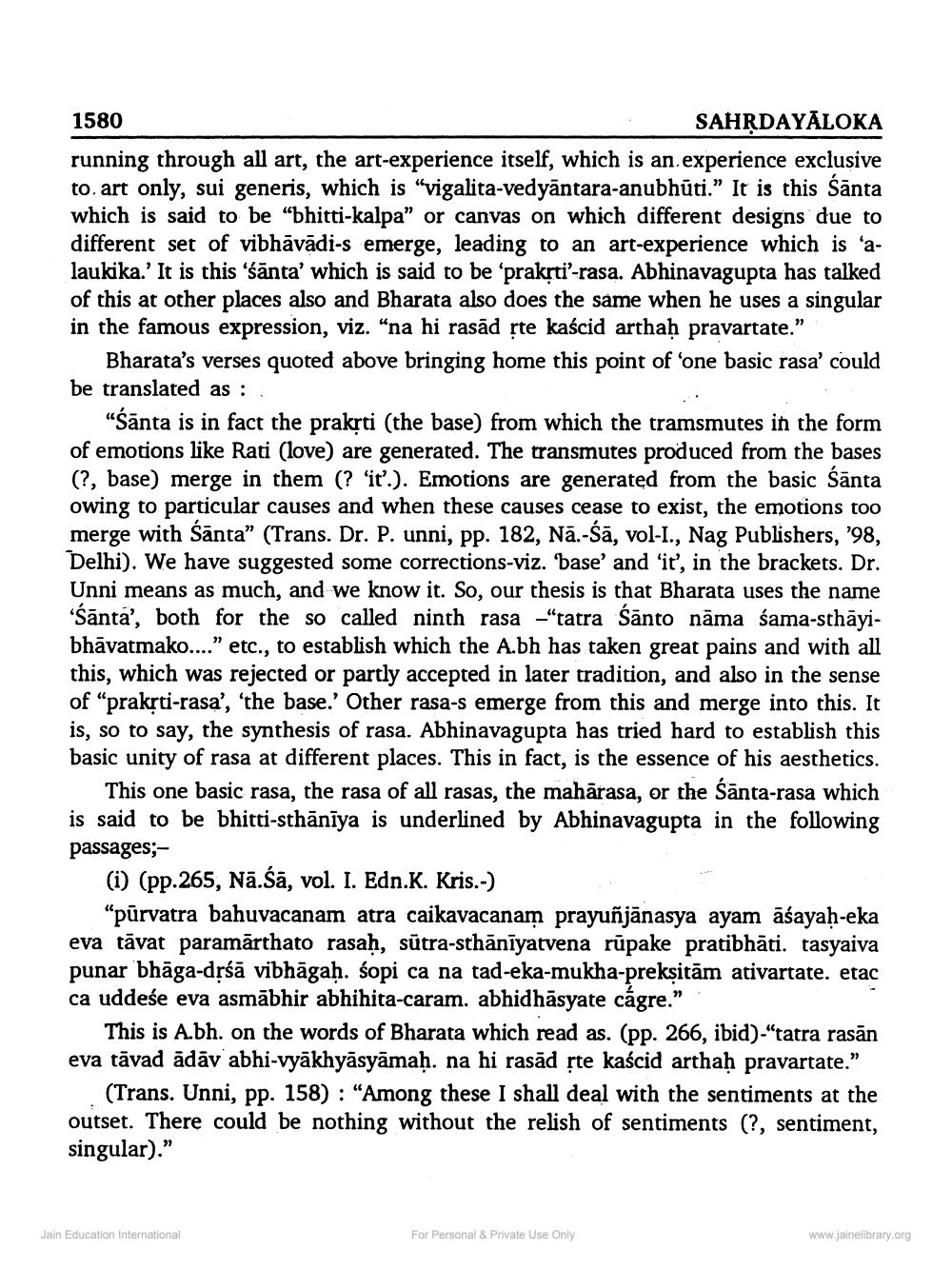________________
1580
SAHRDAYĀLOKA running through all art, the art-experience itself, which is an experience exclusive to. art only, sui generis, which is “vigalita-vedyantara-anubhūti." It is this Sānta which is said to be “bhitti-kalpa" or canvas on which different designs due to different set of vibhāvādi-s emerge, leading to an art-experience which is 'alaukika.' It is this 'śānta' which is said to be 'prakrti'-rasa. Abhinavagupta has talked of this at other places also and Bharata also does the same when he uses a singular in the famous expression, viz. "na hi rasād rte kaścid arthah pravartate."
Bharata's verses quoted above bringing home this point of 'one basic rasa' could be translated as :
"Santa is in fact the prakrti (the base) from which the tramsmutes in the form of emotions like Rati (love) are generated. The transmutes produced from the bases (?, base) merge in them (? 'it'.). Emotions are generated from the basics owing to particular causes and when these causes cease to exist, the emotions too merge with Santa" (Trans. Dr. P. unni, pp. 182, Nā.-Śā, vol-I., Nag Publishers, '98, Delhi). We have suggested some corrections-viz. 'base' and 'it', in the brackets. Dr. Unni means as much, and we know it. So, our thesis is that Bharata uses the name
Sānta', both for the so called ninth rasa "tatra Santo nāma sama-sthāyibhāvatmako....” etc., to establish which the A.bh has taken great pains and with all this, which was rejected or partly accepted in later tradition, and also in the sense of “prakrti-rasa', 'the base.' Other rasa-s emerge from this and merge into this. It is, so to say, the synthesis of rasa. Abhinavagupta has tried hard to establish this basic unity of rasa at different places. This in fact, is the essence of his aesthetics.
This one basic rasa, the rasa of all rasas, the mahārasa, or the Šānta-rasa which is said to be bhitti-sthānīya is underlined by Abhinavagupta in the following passages;
(i) (pp.265, Nā.śā, vol. I. Edn.K. Kris.-)
"pūrvatra bahuvacanam atra caikavacanam prayuñjānasya ayam āśayah-eka eva tāvat paramārthato rasaḥ, sūtra-sthānīyatvena rūpake pratibhāti. tasyaiva punar bhāga-dršā vibhāgah. sopi ca na tad-eka-mukha-preksitām ativartate. etac ca uddeśe eva asmābhir abhihita-caram. abhidhāsyate cágre."
This is A.bh. on the words of Bharata which read as. (pp. 266, ibid)-"tatra rasan eva tävad ädāv abhi-vyākhyāsyāmah. na hi rasad rte kaścid arthah pravartate."
(Trans. Unni, pp. 158) : "Among these I shall deal with the sentiments at the outset. There could be nothing without the relish of sentiments (?, sentiment, singular)."
Jain Education International
For Personal & Private Use Only
www.jainelibrary.org




